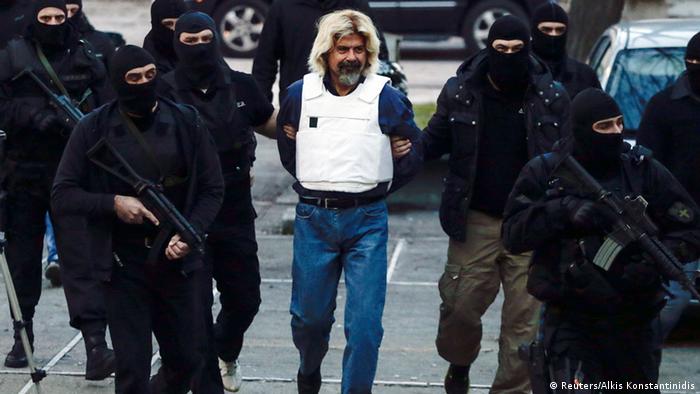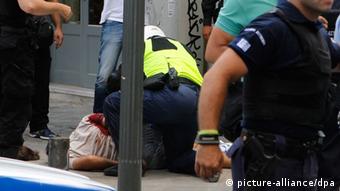US blacklists two Greeks as 'terrorists' amid prison reform row with Syriza
TERRORISM
US blacklists two Greeks as 'terrorists' amid prison reform row with Syriza
The US State Department has designated two Greek guerilla group members, Christodoulos Xiros and Nikolaos Maziotis, as terrorists. This follows a dispute with Athens over a new law changing prison policies.
Xiros (pictured above) and Maziotis, both in jail in Greece, were labeled "terrorists" on Tuesday by the government in Washington, following a disagreement between the US and Greece's new government over prison reforms.
"As a result of these designations, all property subject to US jurisdiction in which Xiros and Maziatis have any interest is blocked and any assets they may have under US jurisdiction are frozen," the State Department said in a statement.
Executive Order 13224 is one of the anti-terror measures enacted by President George W. Bush in the immediate aftermath of the 9/11 attacks, in this case on September 23, 2001.
Christodoulos Xiros, 56, is a member of the now-defunct November 17 group that killed more than 20 people, including Americans, between 1975 and 2000. The shadowy movement was behind the 1975 killing of the CIA's Athens station chief, Richard Welch, and claimed responsibility for a series of attacks on US, British, Turkish and Greek targets. Xiros was convicted as a November 17 hitman. He escaped from prison last year but was recaptured on January 14.
Nikolaos Maziatis, 42, was charged in 2010 over a series of attacks claimed by the Revolutionary Struggle organization, blamed, among other things, for a 2007 rocket-propelled grenade attack on the US embassy in Athens. He had been on the run since 2012 and was arrested in July 2014.
Spat with Syriza over prison reform
Tuesday's announcement followed disagreement between the US and Greece over the new government's planned prison reforms. Under the changes, disabled prisoners who have served most of their sentences can see out the rest of their terms under house arrest. It also abolished controversial, high-security C-type jails, where some of the country's most notorious criminals are held.
The changes could lead to the early release of Savvas Xiros, a bomb-maker for November 17 who was captured in 2002 after sustaining severe injuries when one of his explosives detonated in his hands. According to authorities, he "93 percent disabled," virtually blind and deaf, and suffering from multiple scleorsis. Christodoulos and Savvas Xiros are brothers.
The Syriza-led parliament in Athens passed the reform bill, despite US protests, late on Monday.
The US ambassador to Athens, David Pearce, warned ahead of the parliamentary vote: "If Savvas Xiros - or anyone else with the blood of American diplomats and US Mission members of their hands - leaves prison, it will be seen as a profoundly unfriendly act."
Secretary of State John Kerry had also alluded to the issue during a meeting with his visiting Greek counterpart, Nikos Kotzias, at the State Department.
The new government in Athens, elected on a pledge of reversing the country's recent austerity programs, remains under pressure from international creditors to limit state spending and debt.
msh/rc (AFP, Reuters)


Comments